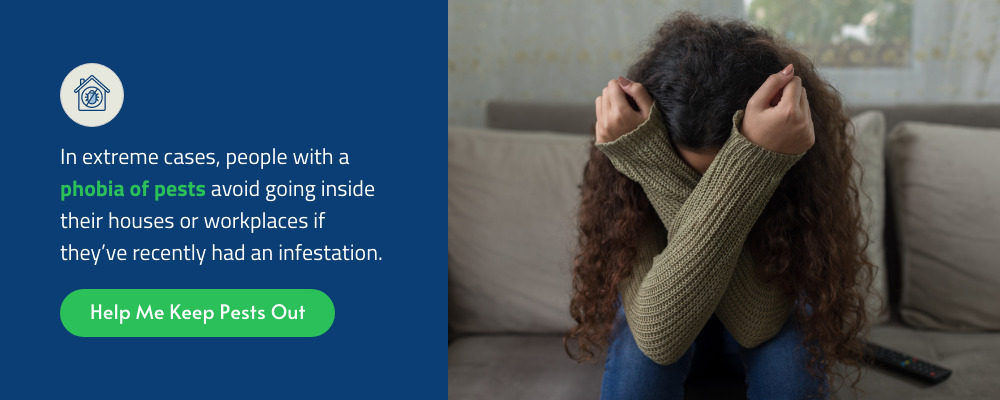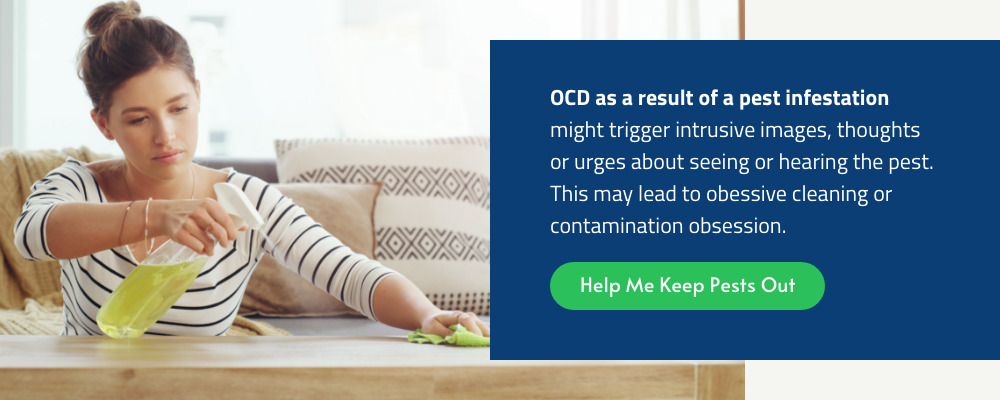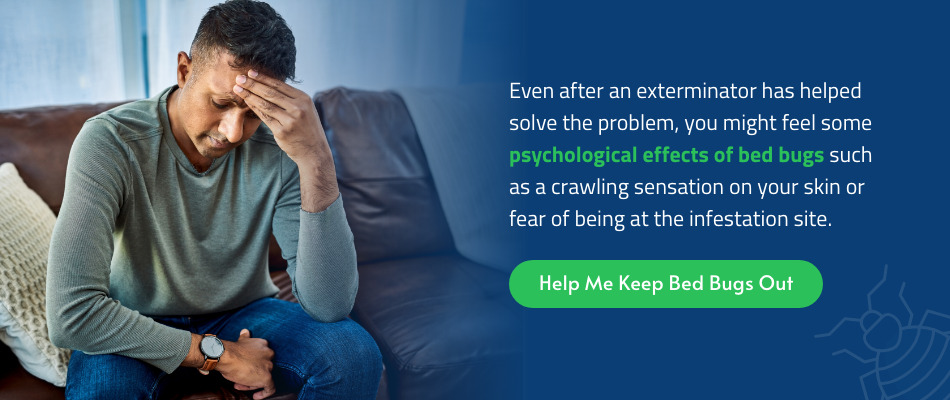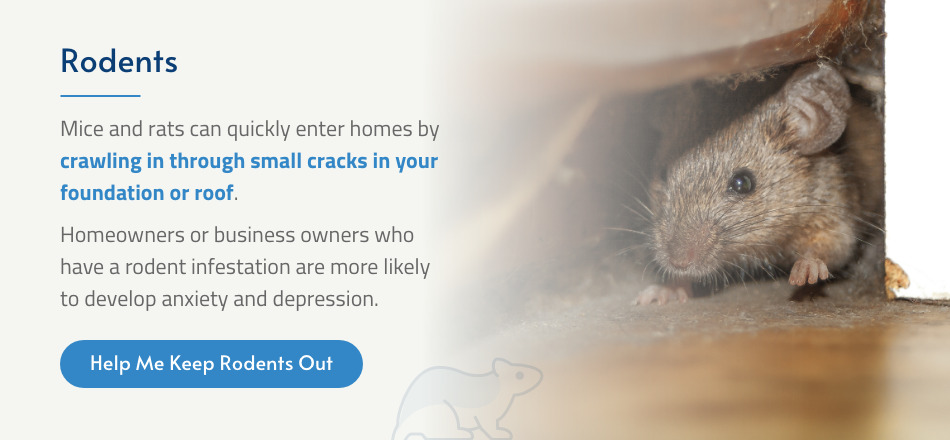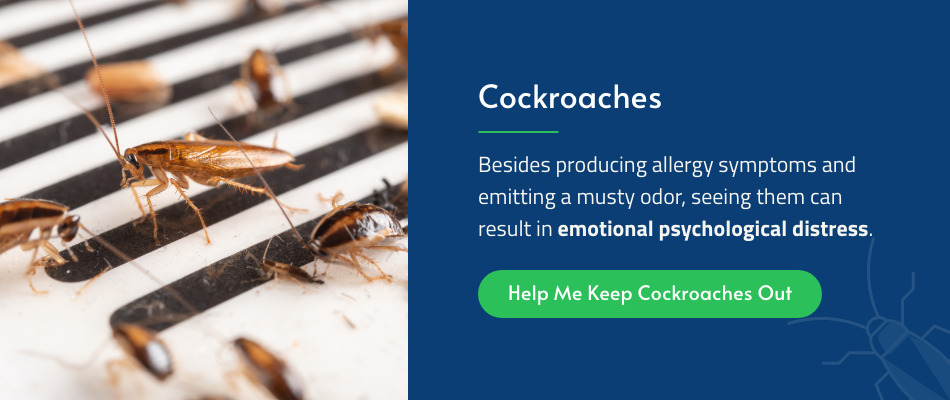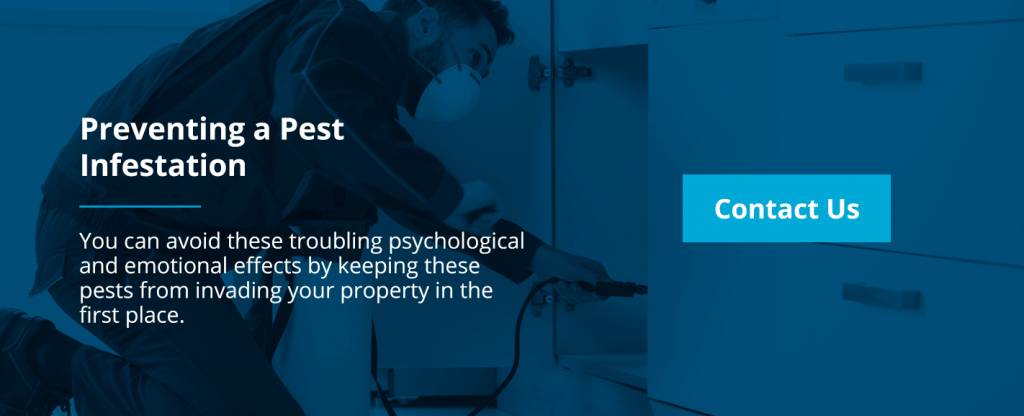Emotional Effects of Pest Infestations
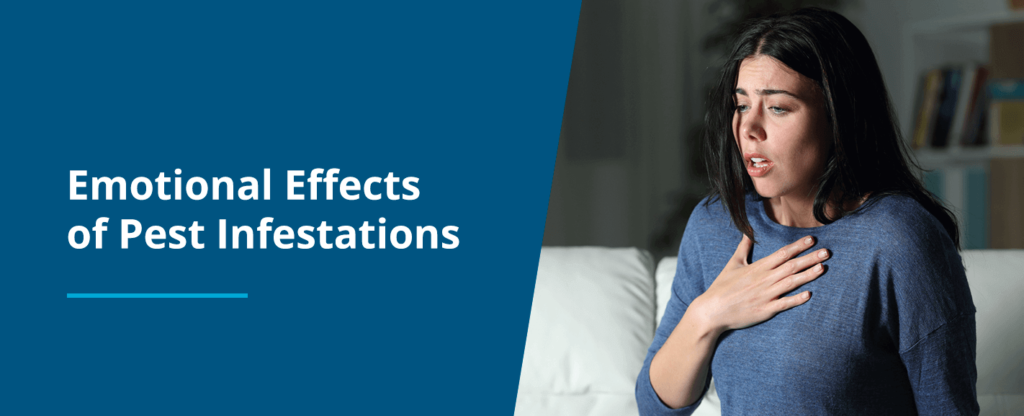
Aside from the physical health concerns surrounding pests and the damage they can do to your home or business, an infestation can also result in emotional and psychological effects. Knowing the harm rodents and insects could have on your home and business can help you prevent an infestation from happening to protect your property and promote your family or staff’s well-being.
Pests can have an emotional impact on the whole family, whether you have older parents or little children living with you. In commercial buildings — such as hotels — rodents, insects and wildlife can drive away guests and employees, harming your business and leading to lawsuits in extreme cases. Learn more about the emotional effects of a pest infestation and contact Pestech to help prevent the likelihood of this problem ever affecting your home or business.
Psychological Effects of Pests
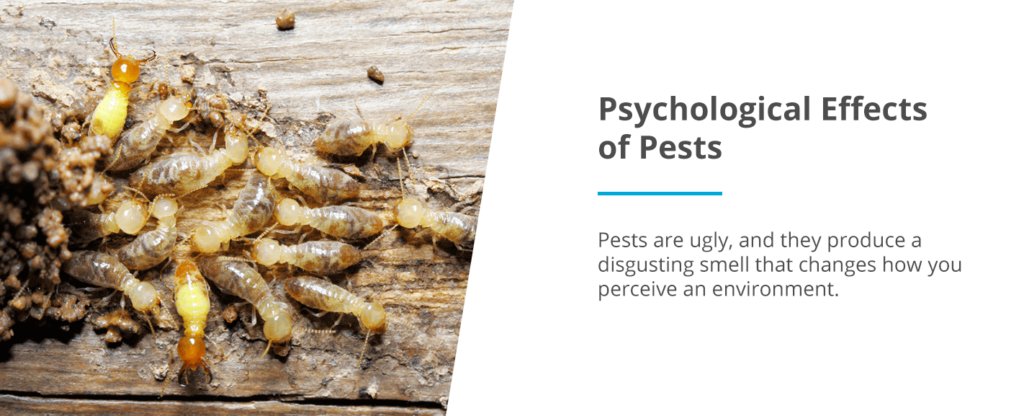
An infestation involves all five senses. Pests are ugly, and they produce a disgusting smell that changes how you perceive an environment. You could hear rodents scurrying around in the walls, or feel bed bugs crawling on your skin. As a result, you may experience nightmares, flashbacks or a general fear of going into a room where you saw bugs. Explore the psychological and emotional effects of pest infestations in your business or home.
1. Phobias
A phobia is an intense fear of a person, place or object that results in disorientation or impairment. This psychological phenomenon produces such an irrational and extreme terror that the person negatively reacts even when thinking about a bug or rodent being somewhere. You would know if you have a phobia to pests if you have any of the following symptoms.
- Intense dread over the pest: A phobia can make a bed bug, cockroach, mouse or insect seem deadly or threatening. Some of these pests carry illness and threaten your property, so this response is a way for your body to protect itself from danger. However, since the fear is so extreme, it can get unbearable if it feels like the end of the world by thinking of the insect or rodent.
- Uncontrollable anxiety: If the sight or idea of a pest triggers you, you might have severe panic attacks. Panic attack symptoms include nausea, a choking sensation, racing heart, trembling, difficulty breathing, chills and sweating. When you encounter the object of your fear, you don’t think properly, so you don’t respond rationally.
- Avoiding places with past or possible infestations: In extreme cases, people with a phobia of pests avoid going inside their houses or workplaces if they’ve recently had an infestation. They also could be afraid of anywhere but their home because they believe it’s the only safe space.
Here are some of the specific types of phobias you may have due to a pest infestation.
- Katsaridaphobia: If you have this phobia, you’re terrified of cockroaches.
- Arachnophobia: This term means you have an intense fear of spiders.
- Entomophobia: People who struggle with entomophobia have an extreme and irrational fear of all insects.
- Musophobia: If you’re terrified of mice and rats, you probably have musophobia.
- Apiphobia: This term describes people who have an intense fear of bees.
- Myrmecophobia: People who have myrmecophobia are excessively and irrationally afraid of ants.
Since the fear is irrational, the best way to handle it is to educate yourself about these pests to better understand their threats and benefits to society. Some insects — such as ants, bees and spiders — promote the ecosystem and eat harmful pests like mosquitoes. You can also learn how to avoid anthills or beehives and create safe places in your house, or call an exterminator to get rid of them.
2. Delusional Parasitosis (DP)
Anytime you encounter a disgusting insect, it’s possible to experience the sensation that it’s crawling all over your skin. However, in extreme cases, this feeling can become so severe that it affects your emotional or psychological health. You might not even realize this is a real disorder, because people won’t always talk about it, so you could develop guilt or shame as a result.
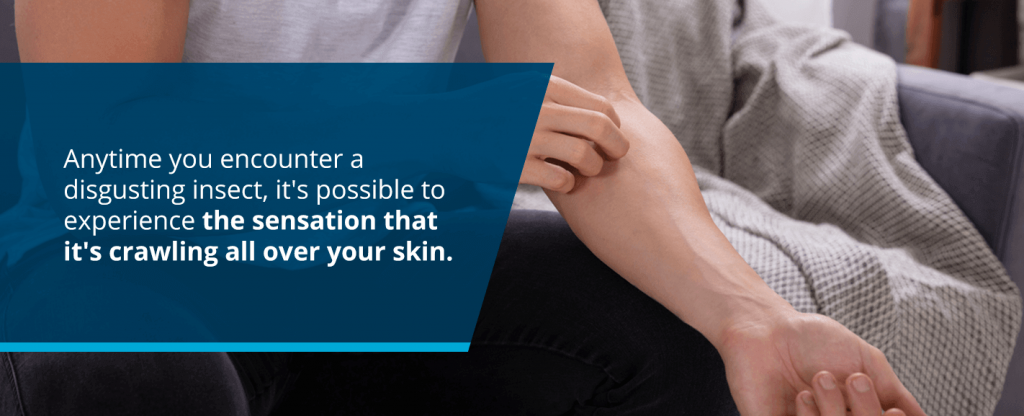
If you’ve had a pest infestation, you might have the following symptoms of DP.
- The presence of invisible bugs: A person who suffers from DP believes that they have an infestation in their house, even if they don’t. They could experience crawling sensations, hallucinations, itchiness, burrowing in the skin and a stinging feeling.
- Self-harm: People with DP will do whatever it takes to eliminate the invisible insects and bugs on their skin. They might try to remove them with tweezers and other products, and scratch excessively to relieve their itchiness. As a result, they end up doing more harm than good.
- Excessive use of pesticides: A person who struggles with DP symptoms may use too many pesticides or chemicals to kill the apparent pests on their property. Even though a pest control professional may use a safe amount of chemicals to deal with the infestation, you can run the risk of harming yourself or your surrounding environment if you use too many pesticides.
3. Obsessive-Compulsive Disorder (OCD)
As a result of developing a phobia, home or business owners who’ve had a pest infestation may also start to have OCD symptoms. This condition involves intrusive images, thoughts and urges into a person’s mind, mostly about seeing or hearing the pest. To get rid of these thoughts that plague their mind, they have to engage in repetitive, or compulsive, behaviors or mental activity, such as cleaning themselves or their surroundings.
People who have anxiety resulting from their fear of pests might exhibit the following symptoms.
- Obsessive cleaning: A person with OCD tends to have a strong urge to clean their house repeatedly. Maybe they’ll sweep the floor, wipe the table or wash their hands multiple times before feeling like their house or body is clean enough. Even though it’s normal and healthy to clean up your property after experiencing an infestation, people who have OCD might clean too much, even if they haven’t had an infestation.
- Contamination obsessions: People who have OCD could become extremely distressed at the thought of coming into contact with germs, dirt, sticky residue or dust. As a result, they could develop cleaning or washing compulsions about themselves, including excessive wiping in the toilet, showering and brushing their teeth. They’ll also feel like their clothes are always dirty, so they’ll feel the need to do laundry more often than necessary.
4. Post-Traumatic Stress Disorder (PTSD)
PTSD is an extreme anxiety disorder that results from a severely distressing event. This condition usually develops when someone has a prolonged or repetitive traumatic experience, and symptoms might not develop until years after the event. People can have PTSD after being swarmed by wasps, bitten by bees or experiencing damage from rodents, cockroaches, bed bugs or spiders.

As a result of their trauma, people living with PTSD have triggers that cause them to relive their negative experience if they see a picture or even a healthy number of insects in a safe location or return to the place they encountered infestation. Here are some of the specific symptoms of PTSD, especially as a result of engaging with a pest.
- Nagging memories: If you’ve experienced a traumatic event, such as seeing or feeling a massive amount of insects or rodents, the memory stays in your head. You’ll have unwanted, repetitive, distressing recollections of what happened and how you felt during the experience. These memories could appear in flashbacks or nightmares, causing you to relive the traumatic experience as if it were happening again. You might even have emotional distress — such as humiliation, fury or depression — when something reminds you of what happened.
- Avoidance: To prevent reliving the experience, you could develop habits of avoidance, trying not to talk or think about what happened. You might stay away from specific places, people or activities that remind you of the event, even if they were sources of comfort before.
- Developing negative thoughts and emotions: Because of your traumatic event, which could’ve triggered feelings of death and hopelessness, you’ll have negative thoughts about the world, other people or yourself. You could have memory problems, including forgetting the essential details of the traumatic event. It might become a struggle to keep up with close relationships, and you may lose interest in the activities you once enjoyed.
- Changes in emotional and physical reactions: A pest infestation influences your physical and emotional health, so the things that once made you happy won’t have that same effect anymore if they remind you of your traumatic experience. As a result, you could get startled or frightened more quickly and always be on guard in case of danger. To numb the pain, you might take part in self-destructive behavior, like drug or alcohol abuse. You may also have trouble sleeping or concentrating, and have irritability or aggressive behavior.
5. Psychological Intervention
Psychological interventions are steps you can take to alleviate distress through planned treatments with a professional. If you, your family or employees have suffered from a change in their mental health after a pest infestation, here are some techniques therapists and doctors use to help.
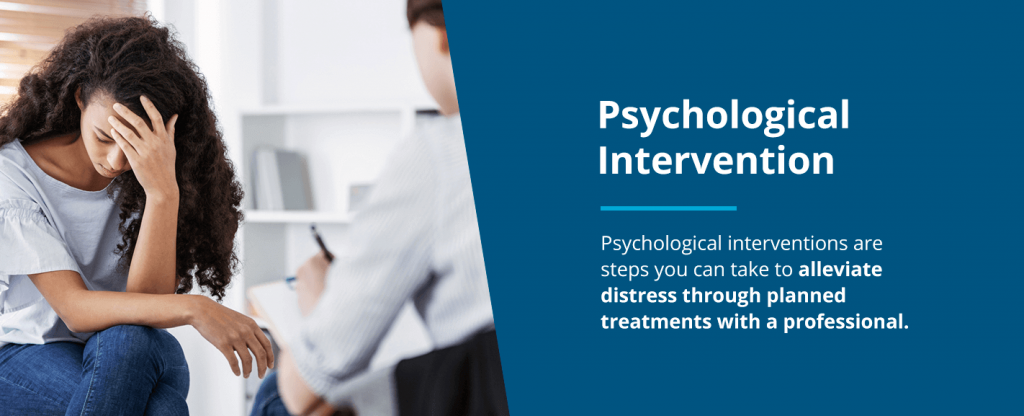
- Exposure therapy: This treatment involves taking part in behavioral procedures to change a person’s response to an insect or rodent. A therapist gradually and repeatedly exposes the patient to the feared pest until they can control their phobia. This technique works because it permits the person to manage their thoughts and perceptions about the problem, allowing them to realize that their fear is irrational.
- Cognitive behavioral therapy (CBT): This technique includes a mixture of gradual exposure and cognitive methods to alter a person’s perception of the feared pest. With therapy, a person with a phobia to rodents or insects can feel a sense of control over their feelings and thoughts. After CBT, when they encounter a previously feared situation, they can easily control their response and overcome the fear.
- Medical intervention: Psychiatrists will often prescribe medicine for people with DP to help them control their hallucinations and delusions. Antipsychotic agents, such as risperidone or olanzapine, can treat this disorder. Along with medicine, the doctor will monitor the patient’s brain activity with an electrocardiograph.
- Treatments from a dermatologist: If you have DP, you have the constant sensation that something is crawling on your skin. Consult a medical professional to put your mind at ease. A dermatologist can confirm whether you have an actual skin condition or suffer from a psychological disorder.
If you find yourself with any of these symptoms or need help, contact a professional therapist who can diagnose the issue. To put your mind at ease, you should also consult pest control services, so a trained technician can treat any bugs you may have or prevent a future infestation.
The Most Emotionally Damaging Pests
You can have PTSD from pests in general, but some cause significant emotional damage. Rodents and insects tend to crawl around in hidden places and show up when you least expect them. They also carry disease and can spread rapidly, so it’s normal and appropriate for you to have some level of concern when you see one. The following pests are the most damaging to your emotions and thoughts.
1. Bed Bugs
If you’ve had a bed bug infestation, it’s typical to be stressed or embarrassed about your experience. Having bed bugs in your home can make you more depressed than usual. If you own a hotel, they can also cause you to worry about your guests’ safety. Here are some reasons bed bugs can be so distressing.
- They multiply: If you see one bed bug, you might have many throughout your property. They travel through your clothes, furniture, flooring and luggage. If you own a hotel or apartment building, you could see them in multiple rooms and get several complaints.
- They bite you while you’re sleeping: Even though bed bugs can exist anywhere, they tend to crawl around in the middle of the night and make their home in comfortable beds. They release a numbing agent that allows them to bite you without waking you up. Just knowing that information is enough to make your skin crawl.
- They’re not easy to treat: Getting rid of bed bugs can be a nightmare in and of itself, especially if you try to do it yourself. Even if you think you’ve eliminated them, one can hide in hard-to-reach corners and cause another infestation. If you don’t hire a professional pest control company, you could end up paranoid and obsessive while treating your property.
Even after an exterminator has helped solve the problem, you might feel some psychological effects of bed bugs, such as a crawling sensation on your skin or fear of being at the infestation site. Though you should have some concern about bed bugs if you find them on your property, you don’t need to be afraid if they’re no longer an issue. A professional pest control company could put your mind at ease and prevent bed bugs from coming into your house.
2. Rodents
Mice and rats can quickly enter homes by crawling in through small cracks in your foundation or roof. Homeowners or business owners who have a rodent infestation are more likely to develop anxiety and depression. If you own a restaurant, mice can send a message to your patrons that the dining area is unclean, and an infestation could ruin your reputation.
Here are some of the reasons rodents have an emotional and physical effect.
- They make unpleasant sounds and smells: As mice or rats move throughout your property, you’ll hear small feet scratching against the inside of your walls or squeaks coming from the ceiling. They can also deposit feces and urine around your home or business, creating smells that reduce the indoor air quality.
- They carry disease: Your body triggers healthy fears to protect you and those in your care from harm. Rats and mice are threats to your health and safety because they bring disease everywhere they go. Unfortunately, repeated exposure to mice can transform your concern into a phobia.
- They’re good at hiding: Since rats and mice are unwelcome guests, they tend to hide in crevices of the house, including inside the walls and basements. Before you know it, they could be eating your food out of the pantries if you don’t deal with them quickly.
- We’ve learned that they’re disgusting: You might have learned at a young age that rats are gross and that you should run away from them. If you see one in your house, you could think that you’ve done a poor job taking care of our living space. Your customers may also believe that the kitchen is filthy if they heard you found a rat in your restaurant.
Having mice in your property is not necessarily a reflection of your ability to keep it clean. You should still call a pest control specialist to determine how they’re getting inside and why they’re staying. By dealing with mice as soon as possible, you can keep your company’s brand clean and give your guests confidence in your products and services.
3. Cockroaches
These disgusting critters usually take up residence in apartments and hotels. Besides producing allergy symptoms and emitting a musty odor, seeing them can result in emotional and psychological distress. Even though they don’t bite, they can carry disease and viruses, and their leg spines could scratch you or your guests and residents.
Cockroaches are scary to have on your property because:
- They spread disease quickly: Like mice, cockroaches carry viruses and bacteria that can make you and your loved ones sick. They can also cause allergy symptoms in some individuals. Since they travel quickly, they can bring disease throughout your entire property.
- They multiply rapidly: If you have one cockroach, especially if you’re in an apartment or commercial building, you probably have several scattered around. Some species can lay up to 50 eggs at a time, so you should deal with a cockroach immediately before they multiply and start an infestation.
- They hide in the dark: Cockroaches like dark, moist places, so you might not spot them right away. They tend to travel at night while you’re asleep, and they stay in the shadows if you turn on the light.
- They dash throughout your property: These critters don’t like light, so when you suddenly turn on a lamp or flashlight, it’ll run in the opposite direction. If you don’t expect to see it, the sudden movement can startle you.
Preventing a Pest Infestation
You can avoid these troubling psychological and emotional effects by keeping these pests from invading your property in the first place. Follow these steps to prevent an infestation.
- Keep your property clean: Clean up after meals you cook and eat, since crumbs and residue can attract mice, cockroaches and ants. It would also help if you straighten up any piles of papers or clothes on your desk or floor, so pests don’t have a place to hide. If you own a business, make sure your housekeeping staff knows about the dangers of pests to clean efficiently.
- Regularly clean your clothes: Body sweat and food stains on clothes attract some pests. Do your laundry a few times a week to keep the rodents and insects out of your closets and drawers.
- Bathe your pets: If you have pets, bathe them regularly, especially after they play outside. Insects, such as ticks and fleas, can latch onto their fur and travel inside the house.
- Check yourself after being outside: Besides clinging to your pets, insects can also travel into the house through clothes and skin. After you’ve spent time outdoors, thoroughly check your clothes, shoes and skin for any wandering bugs.
- Apply lawn treatments: The regular application of lawn treatments kills small pests and eliminates the food source of more prominent threats. Rodents and wildlife will probably skip your house if they can’t find the rood they crave.
With a pest management partner like Pestech, you can significantly prevent pests’ likelihood in your home. We offer residential and commercial pest control services for those who live or work in central New York and the surrounding areas. Besides using pesticides and eco-friendly extermination methods, we also use our Integrated Pest Management system to eliminate your risk of pest infestation.


